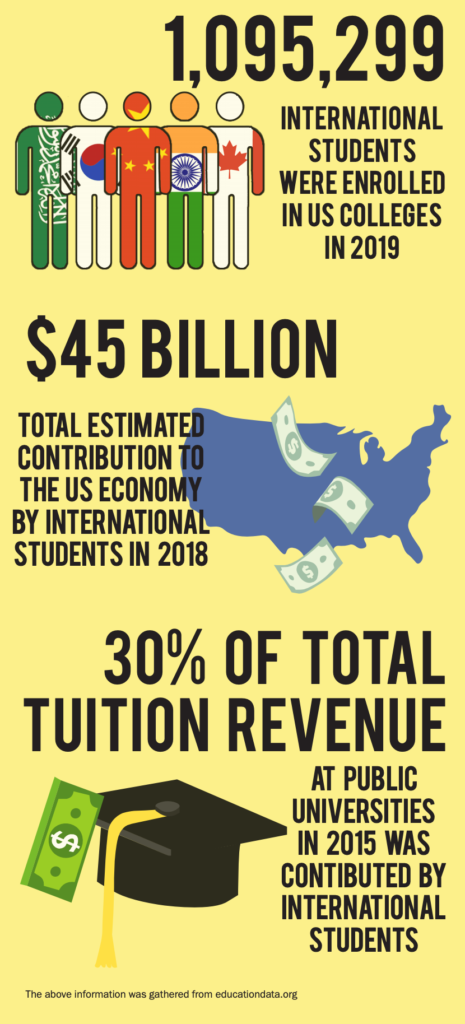
Travel and immigration regulations set in place when COVID-19 began, leaving international students to fear are where and how they would continue their studies.
Assistant Director of the Office of International Education Lisa vonReichbauer worked hard to limit the worries of the 135 international students enrolled at Ferris this year.
“There was quite a bit of ambiguity surrounding this at the time,” vonReichbauer said. “Since Ferris had not moved to fully online courses for the fall semester, we worked with each of our students to secure a schedule that would meet immigration regulations. We sought guidance from the Department of Homeland Security as we developed our plans for student schedules.”
The OIE provided various communication methods for the students to share their concerns or questions when the pandemic hit. They posted updates, FAQs, sent out surveys and held virtual town hall meetings with all the necessary information for students. VonReichbauer and the executive director gave every student their phone numbers to support them whenever they needed it.
Students who stayed at Ferris could take in-person, online or hybrid courses because of the accommodation extension. VonReichbauer said that most students preferred taking in-person classes so that they may still have the “social and intercultural interaction.”
One student affected by these confusing and constantly changing international regulations was biotechnology junior Jennifer Nguyen. Nguyen traveled from Vietnam to obtain a degree from Ferris.
“I remember feeling very uncertain and scared when I first heard the news,” Nguyen said. “I was stuck between two impossibilities: not being able to stay in the U.S. if classes are online, and not being able to go home because there were no flights. The anxiety and uncertainty kept me awake at night for weeks.”
Immigration and Customs Enforcement announced in July any international students taking all online courses would have to leave the United States and the U.S. Department of State would not issue students visas. Every student affected by this now faced more troubles figuring out where they would go as well as staying safe during the pandemic.
This rule was then redacted by the end of the summer. Accommodations placed back in March were extended for students so that they could either continue taking courses in the U.S. Or travel home and take online courses. Those who returned home for online classes maintained their immigration status.
Nguyen took hyflex courses this semester which is a mix of online lectures and in-person labs. It was a difficult adjustment but Nguyen became comfortable with the new normalcy. Though Nguyen has not been able to form a deep connection with the professor through Zoom sessions.
Nguyen decided that she would return home if Ferris made all classes online in the spring semester.
Another issue exists to international students planning to get their college degrees in the U.S. The federal government aims to limit the time international students can stay in the U.S., 2 to 4 years on student visas. However, attorney generals, are joining a coalition against this limit.
“I think a policy change such as this would be extremely damaging to international education in the U.S.,” vonReichbauer said. “Many prospective international students and their families have expressed concern to us that the U.S. is not a friendly and even perhaps not a safe place to study. Policies that increase barriers further will exacerbate these sentiments. As an immigration advisor, I also do not feel these measures are necessary.”
VonReichbauer mentioned that F-1 and J-1 visas are the most monitored and tracked type of visas, which many international students use for their studies in the U.S. Most students understand and carefully follow the regulations so there should not be such an extreme limitation.
Nguyen was disappointed to know of this possible law. Her concerns would only grow if it were put into effect.
Nguyen wanted to get a Ph.D. in Toxicokinetic which would take around eight years in college. This limitation would cause problems to Nguyen’s ability to fulfill her goal.
The made it clear that she is uncomfortable attending college in another country right now because of all the worldly issues happening.
“This is a very unsettling time in the U.S.,” Nugyen said. “With the COVID pandemic and the largest election in history going on, there is a lot of social unrest and uncertainty. This is not my country, and I don’t have many of the legal rights that Americans have. In a time like this, I, as an international student, have to be extra cautious about things I say and do.”
Ferris’ mission and vision statements include promises to deliver “opportunity, discovery and professional preparation for a dynamic global society.” The university wants all of its students to be successful in such an ever-changing society. That may not happen if international students have restricted access to educational resources.
